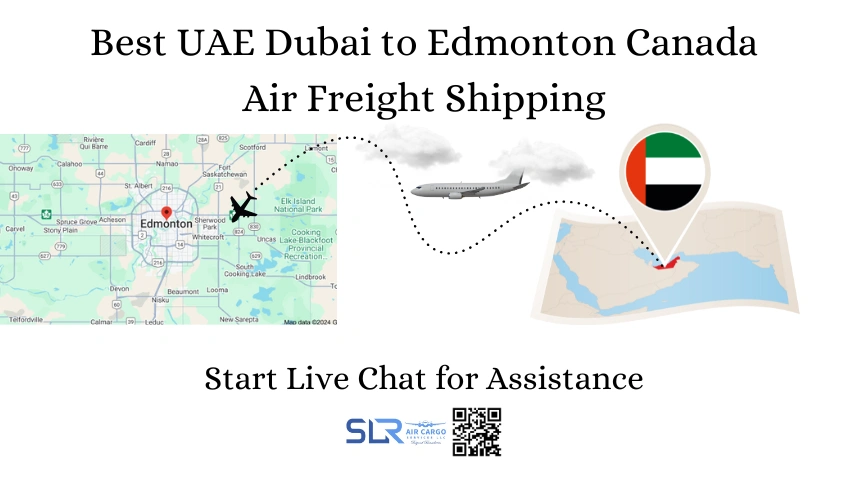Edmonton International Airport (YEG) is the primary airport serving the Edmonton metropolitan area in Alberta, Canada. It is located about 13 kilometers (8 miles) south of downtown Edmonton, the capital city of Alberta. SLR Air Cargo provides UAE Dubai to Edmonton Canada Air Freight Shipping Services.
Here’s an overview:
General Information:
- IATA Code: YEG
- ICAO Code: CYEG
- Location: Edmonton, Alberta, Canada
- Type: Public airport
- Elevation: 2,374 feet (723 meters) above sea level
History:
Edmonton International Airport opened in 1960 and has since undergone significant growth and upgrades. Originally a military airbase, the airport transitioned to civilian use and became a hub for both domestic and international flights. Today, it serves as a major transportation hub for the northern Alberta region.
Facilities:
- Terminals: YEG features a modern terminal with both domestic and international flight operations. The terminal offers a range of amenities including shopping, dining, lounges, and services for both business and leisure travelers.
- Runways: Edmonton International Airport has two main runways, capable of handling large aircraft, with one runway measuring 12,000 feet (3,658 meters) in length.
- Cargo and Freight: YEG has an extensive cargo terminal, facilitating the movement of goods across Canada and internationally. It is a critical hub for the transportation of perishable goods, medical supplies, and other cargo.
Cheapest and Best UAE Dubai to Edmonton Canada Air Freight Shipping
Airlines and Destinations:
Edmonton International Airport is served by numerous major airlines, offering direct flights to destinations across Canada, the United States, and international destinations, such as Europe, Mexico, and Asia. It is especially important for connecting travelers to northern Alberta and the oil sands region.
Transportation and Accessibility:
- Public Transit: Edmonton Transit offers bus services to and from the airport, connecting it with various parts of the city.
- Parking: YEG provides ample parking options, including short-term, long-term, and valet services.
- Taxis and Ride-sharing: Available for easy transport to and from the airport.
Recent Developments:
Edmonton International Airport has been expanding to accommodate growing passenger traffic. In recent years, it has undergone infrastructure upgrades and modernizations, including an expanded international departures area, and is now working on improving its technology and services to better cater to passengers and businesses.
Notable Features:
- YEG is one of the busiest airports in Canada by passenger traffic and is considered the main gateway to northern Alberta.
- The airport’s large cargo operations play a significant role in supporting the region’s economy, including the oil, gas, and agricultural industries.
Edmonton International Airport continues to evolve, maintaining its role as a crucial hub for travelers and businesses in the region.
Air Cargo Shipping Opportunities for Dubai to Edmonton Canada
Edmonton International Airport (YEG) presents several opportunities for air cargo shipping, given its strategic location, modern infrastructure, and growing role in the global supply chain. Here’s an overview of the key air cargo shipping opportunities for the region:
1. Oil & Gas Industry
Edmonton is a central hub for the oil and gas sector, particularly related to the Alberta oil sands. Air cargo services can play a critical role in transporting high-value, time-sensitive equipment, tools, and spare parts needed for operations in the remote oil fields. Opportunities include:
- Transportation of heavy equipment: Special cargo services for transporting large machinery and parts.
- Time-sensitive deliveries: Quick shipping of crucial supplies, like drilling equipment, chemicals, and spare parts, can be critical for minimizing downtime in operations.
2. Agriculture and Food Products
Alberta is a significant agricultural producer, and Edmonton International Airport serves as a gateway for exporting a variety of agricultural products, particularly perishable goods. Air cargo services offer advantages for high-demand agricultural exports:
- Fresh produce and seafood: Quick, refrigerated transport of perishable goods, especially to international markets in Asia, Europe, and the US.
- Livestock and animal products: Efficient shipping solutions for live animals, veterinary supplies, and high-value animal products.
- Grain exports: Air cargo can be used to transport specialized grains or premium agricultural products that require expedited shipping.
3. Medical and Pharmaceutical Shipments
As the healthcare sector in Edmonton continues to grow, air cargo offers opportunities for the transport of sensitive and time-critical medical supplies and pharmaceuticals:
- Pharmaceuticals: Edmonton is home to a number of biotech and pharmaceutical companies, creating a demand for the fast, secure, and temperature-controlled transport of drugs and medical devices.
- Medical equipment: Critical medical equipment like ventilators, imaging devices, and surgical instruments often need to be shipped quickly to meet urgent demand.
4. Technology and Electronics
With Edmonton being a hub for technology and innovation, particularly in fields like artificial intelligence and clean energy, there is a growing need for the fast movement of high-tech equipment and electronics:
- Electronics: Components for industries like telecommunications, IT, and AI are often shipped by air to ensure they reach manufacturers, developers, and customers as quickly as possible.
- Data centers and tech infrastructure: Specialized shipments of equipment, servers, and other tech infrastructure materials are needed to support the growing tech ecosystem in the region.
5. E-Commerce and Retail
The growing e-commerce market, especially for cross-border trade with the U.S. and international markets, presents opportunities for air cargo in Edmonton:
- Expedited shipping of consumer goods: With the rise of online shopping, there is an increasing demand for quick shipping of consumer goods, including fashion, electronics, and accessories.
- Cross-border trade: Given the proximity to the U.S. border, Edmonton is well-positioned for air freight services moving goods to and from the U.S. quickly and efficiently.
6. Specialty and High-Value Goods
Air cargo is ideal for the transportation of high-value, low-volume goods, which can include:
- Jewelry, artwork, and luxury goods: These products benefit from air cargo due to the need for security, speed, and handling care.
- Precious metals and materials: Shipments of raw materials, such as precious metals and minerals, which are integral to various industries.
7. Cold Chain and Perishables
Due to Edmonton’s location and the presence of strong cold storage facilities, the airport is a prime choice for transporting temperature-sensitive goods:
- Cold chain logistics: Transporting perishable products such as pharmaceuticals, food, and medical supplies that require specific temperature control during transit.
- Specialized temperature-controlled shipments: This can include everything from vaccines to high-end gourmet foods.
8. Customs Clearance and Efficiency
The proximity of Edmonton International Airport to key transportation routes and the ability to clear goods quickly through customs makes it an ideal choice for businesses looking to streamline their logistics:
- Efficient customs procedures: Fast and efficient customs clearance processes for both international and domestic shipments reduce delays, making Edmonton an attractive option for global trade.
- Regional distribution hub: The airport can serve as a central point for distribution to the rest of Canada and northern parts of the U.S.
9. Tourism and Event Shipping
As Edmonton is a growing tourist destination with large international events (sports, conferences, festivals), air cargo opportunities exist for shipping goods related to tourism and major events:
- Event materials and logistics: Shipping for conferences, exhibitions, or sports events, such as trade show materials, promotional items, and sports equipment.
- Tourism-related merchandise: Quick shipping of souvenirs and retail items tied to tourism.
Summary of the above topic
Edmonton International Airport is strategically positioned for significant growth in air cargo opportunities, particularly for industries related to oil and gas, agriculture, pharmaceuticals, technology, and e-commerce. Its modern infrastructure, proximity to key markets, and growing international connections make it an ideal hub for companies looking to expedite their supply chains and access global markets.

Dubai to Edmonton, Canada: Air Shipping Overview
Air shipping from (DXB) Dubai to Edmonton (YEG) presents a valuable connection for businesses and individuals looking to move goods quickly between the Middle East and Canada. With Dubai’s status as a major international trade hub and Edmonton’s importance as a key regional center in Alberta, air cargo services on this route cater to diverse industries, ranging from oil and gas to e-commerce and pharmaceuticals.
Here’s an overview of air shipping from Dubai to Edmonton:
1. Cargo Services Available
- General Freight: Shipping standard goods such as electronics, machinery, consumer goods, and industrial equipment.
- Temperature-Sensitive Cargo: Given the need for temperature-controlled transport, Dubai to Edmonton is a critical route for pharmaceuticals, perishable food items, medical supplies, and temperature-sensitive goods.
- Heavy and Oversized Cargo: The route offers facilities for transporting large, heavy items, including construction equipment, oil and gas machinery, and other bulky cargo.
- Hazardous Materials: Dangerous goods, including chemicals and hazardous materials, can be shipped with proper handling and documentation.
- Express Services: Fast shipping solutions are available for time-sensitive shipments, ensuring rapid delivery from Dubai to Edmonton.
2. Key Cargo Types Shipped from Dubai to Edmonton
- Oil & Gas Equipment: As Edmonton is a hub for the oil and gas industry, air cargo from Dubai to Edmonton often involves heavy-duty machinery, tools, and spare parts for the energy sector.
- Agricultural Products: Fresh produce, seafood, and specialty food items, which need quick transport to maintain quality, can be shipped via air cargo from Dubai to Edmonton.
- Pharmaceuticals and Medical Devices: Dubai is a key center for medical and pharmaceutical exports, and Edmonton, with its growing healthcare sector, relies on swift shipments of medical products, devices, and supplies.
- Technology & Electronics: With Dubai’s well-established electronics trade, high-tech equipment, components, and gadgets often find their way to Edmonton’s growing tech and innovation markets.
- Consumer Goods & Retail Products: With the rise of e-commerce, goods such as clothing, electronics, and accessories are frequently shipped from Dubai to Edmonton, catering to both retail businesses and online platforms.
3. Airlines Operating on Dubai to Edmonton Route
- Emirates SkyCargo: As the national carrier of the UAE, Emirates provides robust air cargo services between Dubai and Edmonton, with direct and connecting flights that ensure timely deliveries.
- Air Canada Cargo: Air Canada also offers cargo services between the two cities, serving both passenger and dedicated cargo flights.
- Other Airlines: Other international carriers, including Lufthansa Cargo and Qatar Airways, may offer connecting services through their respective hubs.
4. Transit Time
- The typical transit time for air freight between Dubai and Edmonton is around 1 to 3 days depending on the shipping service selected (express or standard).
- This quick delivery time makes air cargo an ideal option for businesses requiring expedited shipments.
5. Customs Clearance
- Dubai: Dubai’s customs procedures are streamlined, and freight forwarders often assist in ensuring that all required documents, including bills of lading, invoices, and packing lists, are prepared for export.
- Canada (Edmonton): Canada Customs has strict import regulations. However, air freight typically benefits from faster clearance compared to sea freight. It is essential to ensure all duties, taxes, and any required permits for specific cargo types (like pharmaceuticals or hazardous materials) are in place.
- Documentation: Shippers will need to provide complete documentation, including a commercial invoice, air waybill, certificate of origin, and any other documents required by Canadian authorities.
6. Air Cargo Rates and Costs
- Shipping costs vary based on several factors:
- Weight and Volume: Charges are typically based on the volumetric weight (dimensional weight) or actual weight, whichever is higher.
- Type of Cargo: Specialty cargo, such as temperature-sensitive or hazardous materials, can incur additional costs.
- Service Level: Express services are faster but more expensive than standard shipping.
- Customs Fees and Duties: Canada imposes duties and taxes on imported goods, which must be factored into the total cost of air freight.
7. Air Cargo Shipping Process
- Booking: Shippers can book their cargo through freight forwarders or directly with airlines offering air freight services. Booking typically includes providing details about the cargo, destination, and delivery time frame.
- Preparation: Cargo must be packed according to airline and customs requirements, especially for fragile or sensitive goods.
- Shipping: Once booked and prepped, the goods are transported from Dubai to Edmonton, typically via a direct or connecting flight.
- Customs Clearance: On arrival in Edmonton, the cargo will go through Canadian customs. Upon clearance, it is delivered to the final destination.
8. Transportation and Delivery in Edmonton
- Once the cargo arrives at Edmonton International Airport (YEG), it is processed at the airport’s cargo terminal.
- Local transport services, including trucking, can be arranged to move goods from the airport to warehouses, distribution centers, or final delivery addresses in Edmonton or the broader Alberta region.
9. Advantages of Air Cargo from Dubai to Edmonton
- Speed: Air cargo offers one of the fastest ways to ship goods between Dubai and Edmonton, reducing lead times for businesses and consumers.
- Reliability: Air shipping is typically more reliable than sea freight, with fewer delays due to weather or port congestion.
- Global Connectivity: Dubai’s position as a global air travel hub makes it a key connection point for goods traveling from Asia, Europe, the Middle East, and beyond.
- Security: Air cargo is generally considered safer and more secure compared to other modes of transport, minimizing the risk of damage, theft, or loss.
Summary of the above topic:
Air shipping from Dubai to Edmonton offers a fast and efficient way to transport goods between these two important global markets. Whether it’s oil and gas equipment, agricultural products, high-tech electronics, or pharmaceuticals, air freight provides a valuable solution for companies needing rapid, secure, and reliable transportation. The strong logistics infrastructure at both airports ensures that cargo moves smoothly, making this route a key part of the supply chain for various industries.
Dubai to Edmonton Canada air cargo rates or prices or cost and time
The cost and time for air cargo from Dubai to Edmonton, Canada can vary depending on several factors, including the type of cargo, weight, volume, urgency, and specific service providers. Below is an overview of the general rates, cost factors, and estimated shipping times for air cargo on this route:
1. Estimated Air Cargo Rates/Costs
Air cargo rates are typically calculated based on weight and volume, with rates varying depending on the specific airline or freight forwarding company used. Here’s an overview of typical cost components:
- Standard Air Freight Rates: Air cargo rates can range from USD $3 to $8 per kilogram (depending on the weight and service level). For instance:
- For lighter shipments (less than 100 kg), the rate may be higher per kg, possibly around USD $6-$8/kg.
- For heavier shipments (over 100 kg), the rate might decrease to USD $3-$5 per kg.
- Volumetric Weight Charges: Air cargo is usually charged based on the volumetric weight (dimensional weight) if it exceeds the actual weight. For instance, for a shipment that is large but lightweight (e.g., clothing or electronics), you may be charged according to its volumetric weight, calculated as:
- Volumetric Weight (kg) = (Length x Width x Height in cm) ÷ 5000.
- Special Cargo Types: Certain cargo types, such as temperature-sensitive goods (pharmaceuticals, perishables), hazardous materials, or oversized/heavy cargo, can incur additional surcharges.
- Temperature-controlled (Cold Chain): Around USD $10-$15 per kg.
- Oversized Cargo: Additional handling fees could apply, increasing the overall cost by USD $200 to $1000 (depending on the size and weight).
- Hazardous Cargo: Additional costs for special handling and paperwork.
- Additional Fees: These could include fuel surcharges, security fees, customs clearance charges, and delivery charges at the destination.
2. Estimated Air Cargo Shipping Time (Dubai to Edmonton)
The transit time for air cargo shipments from (DXB) Dubai to Edmonton (YEG) typically ranges between 1-3 days depending on the following:
- Direct Flights: Direct flights can deliver cargo in 1-2 days. Emirates SkyCargo, for example, offers direct services between Dubai and Edmonton, which helps to expedite the shipping process.
- Connecting Flights: If the cargo is routed through other international hubs (such as Frankfurt, London, or Toronto), the transit time could increase to 2-3 days due to layovers and connecting flights.
- Express vs Standard Services: For express services, goods can be delivered in 24-48 hours. However, standard services may take 2-3 days, depending on availability and routing.
- Customs and Handling: Delays at customs or during handling at the airport can add additional time, particularly for specialized or high-value goods. In general, air cargo to Edmonton would undergo relatively fast customs processing, as air freight typically clears faster than sea or land cargo.
3. Factors Affecting Cost and Time
- Weight and Volume: Heavier and larger shipments will cost more. Also, the volume of the goods might affect whether volumetric weight is applied.
- Service Level: Express shipping or priority air cargo options are faster but more expensive. Standard freight services might be less expensive but take longer to deliver.
- Cargo Type: Temperature-sensitive, hazardous, or oversized cargo requires additional handling, insurance, and sometimes special flights, which can significantly increase costs.
- Fuel Surcharges: Global fuel prices can affect the cost of air cargo services, with surcharges potentially increasing during periods of high fuel costs.
4. Example Cost Calculation
Let’s consider an example for a 100 kg shipment from Dubai to Edmonton:
- Base rate (USD $5 per kg): 100 kg = USD $500
- Volumetric weight surcharge (if applicable): If the shipment’s volume exceeds its weight, you may be charged based on the volumetric weight.
- Fuel surcharge: Typically 10-20% of the total cost. For example, a 15% surcharge would add USD $75.
- Total Estimated Cost: For a 100 kg shipment, you might expect to pay around USD $600-$650, depending on surcharges and additional services.
For small shipments (less than 20 kg), costs could range from USD $100 to $300 depending on the service level and specific cargo details.
5. Cargo Service Providers
- Emirates SkyCargo: Offers direct flights and specialized air freight services.
- Air Canada Cargo: Provides cargo solutions to and from Edmonton, including temperature-sensitive and standard freight.
- Qatar Airways Cargo: Often offers competitive rates and efficient services with connecting flights.
- Freight Forwarders: Companies like DHL, Kuehne + Nagel, and DB Schenker offer air cargo services with full door-to-door solutions, including customs clearance.
Conclusion:
- Cost: Air cargo rates from Dubai to Edmonton typically range between USD $3 and $8 per kilogram, depending on the weight and type of cargo, with additional fees for specialized services like cold chain, hazardous materials, or oversized goods.
- Time: Shipping from Dubai to Edmonton typically takes 1 to 3 days, depending on the service chosen and whether it’s a direct or connecting flight.
For accurate and specific quotes, it’s best to consult directly with freight forwarders or airlines offering these services, as rates can fluctuate based on current market conditions, shipment details, and cargo specifications.

Door-to-Door Air Cargo Shipping from Dubai to Edmonton, Canada
Door-to-door air cargo shipping is a convenient option for businesses and individuals looking to transport goods from their location in Dubai directly to their destination in Edmonton, Canada. This service handles every step of the shipping process, including pick-up, air transport, customs clearance, and final delivery. Here’s an overview of the process, costs, and estimated time for door-to-door air cargo shipping from Dubai to Edmonton:
1. Process for Door-to-Door Air Cargo Shipping
The door-to-door service typically includes the following steps:
a. Pick-Up from the Origin (Dubai)
- Collection: A shipping provider or freight forwarder will arrange for the collection of goods directly from your location in Dubai (warehouse, home, or business).
- Packaging: The goods will be carefully packed to ensure safe transit. Packaging is typically done in line with the nature of the cargo (e.g., temperature-sensitive, fragile, oversized).
- Documentation: Required shipping documents will be prepared, including the air waybill, commercial invoice, certificate of origin, and any other necessary paperwork for customs clearance.
b. Air Transport
- Cargo Handling: After pick-up, the goods are transported to the airport (Dubai International Airport – DXB), where they are loaded onto the flight to Edmonton International Airport (YEG).
- Shipping Route: Depending on the carrier, your shipment may either be on a direct flight or a connecting flight with layovers at other major hubs (e.g., Frankfurt, London, or Toronto).
c. Customs Clearance in Canada (Edmonton)
- Customs at Destination: Upon arrival at Edmonton International Airport, the goods will undergo customs clearance. A freight forwarder or customs broker can handle this process to ensure all duties, taxes, and import regulations are met.
- Documentation for Canada: Necessary documents include the commercial invoice, air waybill, and any permits or certifications required for the specific type of cargo (e.g., for pharmaceuticals, hazardous materials, or food products).
- Customs Duties and Taxes: Import duties and taxes will be calculated based on the type and value of goods being shipped. Air cargo generally has faster customs clearance compared to sea freight.
d. Final Delivery in Edmonton
- After customs clearance, the goods are delivered to the designated address in Edmonton, whether it’s a warehouse, office, or residential address.
- Last-Mile Delivery: The freight forwarder or shipping company will arrange for the goods to be transported from Edmonton International Airport (YEG) to the final destination, completing the door-to-door service.

FAQs: Dubai to Edmonton Air Cargo Shipping
1. What is the typical shipping time for air cargo from Dubai to Edmonton?
The shipping time for air cargo from Dubai to Edmonton usually ranges from 1 to 3 days, depending on whether the flight is direct or requires a connection. Direct flights may take as little as 1-2 days, while connecting flights could extend transit to 2-3 days.
2. How much does air cargo from Dubai to Edmonton cost?
The cost of shipping air cargo from Dubai to Edmonton depends on factors like the weight, size, and type of goods. On average, rates range from USD $3 to $8 per kilogram. Additional fees may apply for special services such as temperature-controlled shipping or oversized cargo.
3. What types of goods can be shipped from Dubai to Edmonton by air?
A wide range of goods can be shipped from Dubai to Edmonton, including:
- General Freight: Electronics, machinery, consumer goods
- Perishable Items: Food, pharmaceuticals, and other temperature-sensitive goods
- Heavy Equipment: Oil and gas machinery, construction materials
- Hazardous Materials: Chemicals and dangerous goods (with proper documentation)
- E-commerce Goods: Clothing, electronics, and more
4. What are the customs requirements for air cargo from Dubai to Edmonton?
All air cargo arriving in Canada (Edmonton) must comply with Canadian customs regulations. Shippers are required to submit a commercial invoice, air waybill, and other necessary documentation. Customs clearance may take 1-2 days depending on the type of goods being shipped. Duties and taxes may apply.
5. Can I track my air cargo shipment from Dubai to Edmonton?
Yes, most air cargo providers offer tracking services that allow you to monitor your shipment in real-time. You can track your air cargo using the air waybill number provided at the time of shipment.
6. What is the best option for door-to-door air cargo from Dubai to Edmonton?
Door-to-door air cargo services offer the most convenient solution for shipping goods from Dubai to Edmonton. Providers like Emirates SkyCargo, DHL, and FedEx offer comprehensive door-to-door shipping, which includes pick-up in Dubai, air transport, customs clearance, and final delivery to your address in Edmonton.
7. Are there any extra charges for air cargo shipping from Dubai to Edmonton?
Yes, additional charges may apply, including:
- Fuel surcharges
- Customs brokerage fees
- Pick-up and delivery fees
- Insurance for high-value goods
- Special handling fees for temperature-sensitive or hazardous materials
8. How can I reduce the cost of air cargo shipping from Dubai to Edmonton?
To reduce shipping costs, consider:
- Consolidating shipments: Combine smaller shipments to benefit from lower rates per kilogram.
- Choosing slower shipping options: If timing is flexible, selecting a standard service instead of express shipping may save costs.
- Optimizing packaging: Ensure your shipment is packed efficiently to minimize weight and volume, which can impact the cost.
9. Can I ship oversized or heavy cargo from Dubai to Edmonton?
Yes, oversized and heavy cargo can be shipped from Dubai to Edmonton, but it may incur additional costs and require special handling. Be sure to inform your air cargo provider in advance so they can arrange the proper equipment and documentation.
10. How do I arrange air cargo shipping from Dubai to Edmonton?
To arrange air cargo shipping from Dubai to Edmonton, you can:
- Contact freight forwarders or air cargo carriers like Emirates SkyCargo, DHL, or FedEx.
- Provide details about the shipment, including weight, dimensions, and destination.
- Choose the service level (e.g., express, standard) and any additional options such as insurance or temperature control.
11. What are the benefits of shipping by air from Dubai to Edmonton?
Shipping by air offers several advantages, including:
- Speed: Fast delivery in 1-3 days
- Reliability: Less affected by weather or delays compared to sea or road transport
- Security: Higher levels of security and reduced risk of damage or theft
- Global Reach: Air cargo is ideal for shipping goods globally, with efficient transit between Dubai and Edmonton
12. Is insurance available for air cargo shipping from Dubai to Edmonton?Yes, insurance is available for air cargo shipments. It is highly recommended for high-value goods or sensitive shipments. The cost of insurance is typically 1-3% of the total value of the shipment and can provide coverage for damage or loss during transit.


Write a Comment